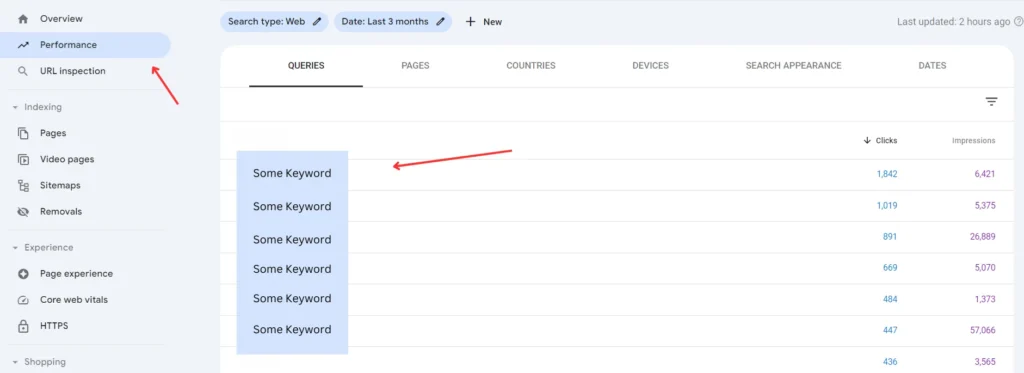Keyword intent matters because it dictates the objective a user seeks to perform on your website.
These can be broken down into people looking for information, people looking to navigate to a specific page, and people looking to perform a commercial transaction.
You have heard of the phrase square peg in a round hole, right? If you are not targeting the correct keywords, you may quickly find that your users are not converting, generating sales leads or even digesting your informational content.
Here we will help you find out what keywords your website is picking up traffic for, and if they are the right type of keywords to help you achieve your strategic objectives.
The importance of keyword intent should hopefully, become clear after reading this article.
What Type of Website do you have?
You should ask yourself a simple question. What type of website do you have?
Usually, your site will into one of the fall into one of the following categorisations:
- Informational Website
- Commercial Website
Is your website a place people go to find information on topics, is it an informational website? A beacon of knowledge.
Or is your website a place to go where people are looking to purchase a product or service? A place where you seek to sell lots of products and grow your business. A commercial website.
Now yes we get it, there are a thousand in-betweens here, you could have an affiliate website, run a non-profit charity or a mix of both worlds. You could have an informational website while also generating revenue through advertisements or referrals.
For the sake of clarity and strategic focus, it is useful to categorise your website primarily into one of these two types. It will either aim to generate revenue, or it won’t.
Check Google Search Console
Google Search Console is a free tool provided by Google. It will show you information on what keywords your web pages show up for in the search results.
If you open Google Search Console, click on performance and you will see the “Queries” column. These are the keywords users have typed in to find your website in Google.

Now if you sell shoes online and you see queries here such as “Shoes for sale”, “Black Shoes” or “Prada Satin Sandals”, you are targeting commercial keywords.
These people want to buy, your website is showing up and you are getting clicks.
If you see keywords such as “What are the best wellies?” or ” Best new shoes 20204″, you are targeting informational keywords, these people may not be looking to buy right now but are just looking for information at this point.
Understanding the Funnel
When people are looking for a product they often start with a broad term or informational query.
I want to buy a new TV so I may search “What is the difference between HD and OLED?”.
Upon reading the article, I was convinced OLED was the way to go, so now I performed another search, I searched for “Oled TV”.
Upon scanning a TV website, I liked the look of a particular OLED TV called the “Sony Bravia 65-inch OLED 4k Google TV”.
Now I was considering purchasing the TV from this store, but it will not hurt to search for the product online, who knows I may find it cheaper elsewhere, so now I Google “Buy Sony Bravia 65-inch OLED 4k Google TV”.
You see what has happened here, I started at the top of the funnel with an information query, and as I progressed my queries became product-specific. By this time I am now at the end of the funnel with commercial or transaction keywords. I am a hot customer at this point, primed and ready to purchase. This is the type of customer any e-commerce business loves to have.
Connecting the dots
So there we have it, if you are not ranking well for commercial or transaction keywords, not targeting people on the journey to the bottom of the funnel, you will not pick up as many sales or queries.
If you have an e-commerce website, this is exactly the type of customer you need to be in front of.
You could be getting 90’000 visitors a month and still have poor sales if you are not targeting keywords with a commercial intent behind them.
We have heard from many business owners who feel they have great traffic but do not convert enough customers, there could be many reasons for this but the most obvious place to look is at the intent behind these visits.
It can also be easy to make mistakes on your website with regard to targeting and intent. Let’s say you have an electrical installation business and you sell and install car charges to businesses, you may decide to create a page targeting your local area and name a page ” EV Car Chargers Manchester”.
But if you Google the term, you will see the results show a list of places where people can recharge their vehicle.
The search engines understand the intent behind keywords, and they base in part search results on how well your page can satisfy this intent.
It would have been much better to call this page “EV Charge Point Installers” for example. Here you know somebody is looking for an installation and not just a charge point.
What Next?
Hopefully, now you understand why keyword intent is important. It is about getting the right type of visitors to your website.
So what do we do about it armed with this knowledge? We optimise pages to satisfy the intent of the end user.
What information would you expect to be on a commercial page? Prices? Lead times? Returns Information? Delivery Information?
You do not normally find this type of content on an informational page, this page for example is informational. The type of content on the page is like a clue to the search engines, this page is clearly informational.
It is no good just focusing on keywords anymore, you must focus on satisfying search intent. This can be answering questions or simply just providing a solution to a problem.
Let us just say this again for dramatic effect. If you take one thing away from this article, this should be it. Focus on satisfying the intent behind a user’s search query.
Okay, so you could start by reviewing the top-ranking pages of the term you wish to rank for, and make notes of what information they display that you are not. You can then go further, what information are they missing that would be classed as “Helpful” to the end user?
We want to satisfy search intent better than our competitors.
If you have a basic understanding of SEO you will notice a shift here. People used to focus on keywords, how many times is this keyword mentioned, and where is it mentioned?
Now we think in terms of intent.
Contact Frankenstein Digital
If you would like to discuss search intent a bit more or have us look over your website to help you improve conversions, simply reach out to us when you are ready.

